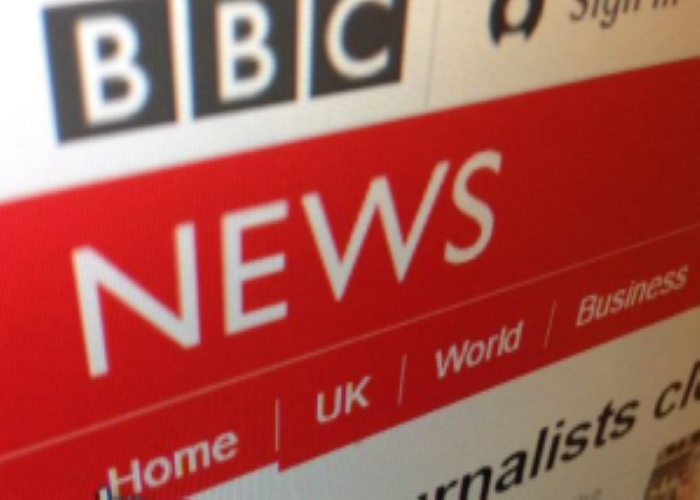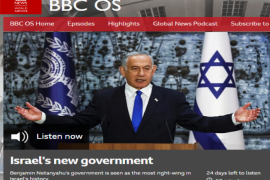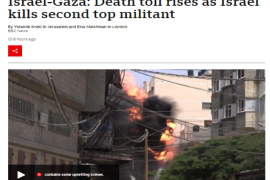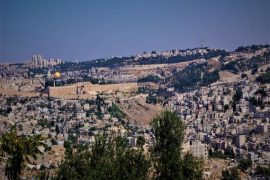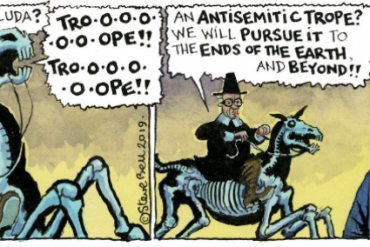On July 20th a filmed report titled “Gaza’s disturbing cases of suicides” – credited to Yolande Knell of the BBC’s Jerusalem bureau and Rushdi Abualouf of the BBC’s Gaza office – was published on the BBC News website’s ‘Middle East’ page.
“The sudden death in Gaza of activist Suleiman al-Ajuri has shone a spotlight on the issue of people in the territory taking their own lives.
By the middle of this year, 30 people had killed themselves and a further 600 had attempted to, according to local human rights group, Palestinian Center for Conflict Resolution.
An Israeli and Egyptian blockade of Gaza, tough living conditions and a lack of freedom of expression under the rule of Palestinian militants are believed to be factors.” [emphasis added]
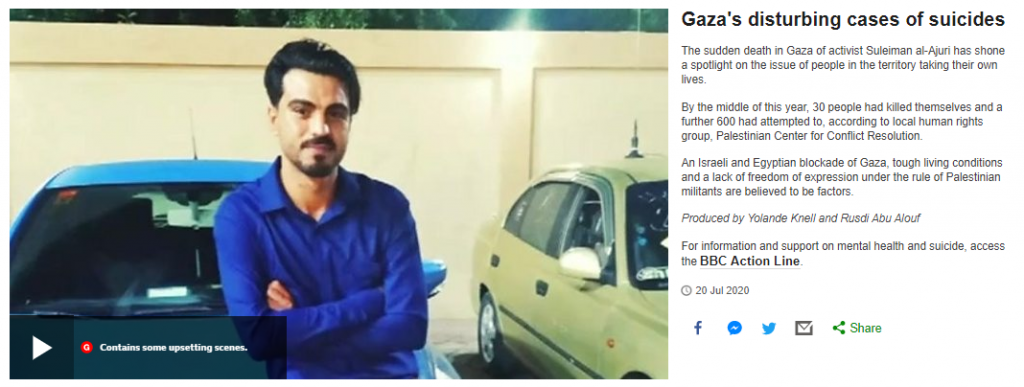
The July 20th afternoon edition of the BBC World Service radio programme ‘Newshour’ included (from 49:21 here) an audio version of the same report from Yolande Knell which was introduced by presenter Tim Franks as follows:
Franks: “A Palestinian human rights group has expressed concern about what it says is a sharp uprise in the number of people taking their own lives in the impoverished Gaza Strip. More than 30 people are said to have done so this year while hundreds more have attempted to kill themselves. Tough living conditions and a lack of freedom of expression under Hamas rule are believed to be factors.”
A representative from that quoted organisation – Rabee Hammoud – was interviewed in both reports. [emphasis added]
Filmed:
“Families of suicide victims in Gaza don’t usually speak out. Suicide is a taboo in the strict Islamic society. A human rights group says more than 30 people killed themselves and 600 more attempted suicide in the first half of 2020.”
Hammoud [subtitles]: “The main causes of suicide are the political division which plays a major role and the long siege that people have been living under in Gaza. When someone decides to kill himself, he has reached a dead end and has exhausted all options. It is not an instant decision.”
“Hamas authorities say there is no suicide crisis. But conditions in Gaza – under blockade by Israel and Egypt – are getting tougher. With youth unemployment at 64%, many feel great despair.”
Audio:
Knell: “In Gaza’s conservative Islamic society suicide remains a taboo. But a human rights group here says there’s been a sharp rise in the number of cases. It says it’s recorded over 30 people who killed themselves this year and 600 more attempted suicides. Rabee Hammoud is from the Palestinian Center for Conflict Resolution.”
Hammoud [voiceover]: “The main causes of suicide are the political division which plays a major role and the long siege that people have been living under in Gaza. When someone becomes convinced about killing themselves, he has reached a dead end and has exhausted all opportunities.”
Knell: “Hamas denies there’s a suicide crisis but conditions in Gaza, long under blockade by Israel and Egypt, are getting tougher. Nearly four in five young graduates now have no work. There’s a growing sense of despair.”
Interestingly, the BBC chose to translate and include Hammoud’s reference to a “long siege” despite the fact that there is no “siege” on the Gaza Strip (as acknowledged by the BBC in September 2019). Audiences were not however given an explanation of his reference to “the political division”.
Neither report provided audiences with any information concerning Rabee Hammoud’s role at the Palestinian Center for Conflict Resolution (actually the Palestinian Center for Democracy and Conflict Resolution or PCDCR) or his mental health related credentials. BBC editorial guidelines on impartiality state:
“4.3.12 We should not automatically assume that contributors from other organisations (such as academics, journalists, researchers and representatives of charities and think-tanks) are unbiased. Appropriate information about their affiliations, funding and particular viewpoints should be made available to the audience, when relevant to the context.”
Despite the fact that the PCDCR is the sole source for both these reports, audiences were told nothing about its foreign funding, its participation in ‘lawfare’ campaigns against Israel or its decidedly politicised ‘particular viewpoints’.
Neither were BBC audiences informed that another Palestinian NGO, Al Mezan, has cited different figures than the ones promoted in these reports:
““We have registered 17 suicides and hundreds of attempted suicides, namely among young people,” since the start of the year, said Samir Zaqout, deputy director of the Al Mezan Center for Human Rights.
He told AFP that “extreme poverty,” difficult living conditions and a lack of freedom of expression under the Hamas rule were all factors behind these suicides.”
Yolande Knell’s two reports both feature one particular case but tell audiences very little about the “lack of freedom of expression under Hamas rule” cited in Franks’ introduction.
Filmed:
“Suleiman al Ajuri was 25, a popular graduate from Gaza. In July he took his own life. Suleiman had led “We Want to Live” protests against poverty. They were seen as the greatest challenge to Hamas rule since 2007 and were violently broken up. Suleiman was arrested and accused of spreading chaos.”
Audio:
Knell: “He was a popular 25-year-old with a degree in accountancy. So why did he take his own life at the start of this month? Suleiman had been a leader of the ‘We Want to Live’ movement. In March last year it staged large protests against unemployment and poverty. They were seen as the greatest challenge to the Islamist group Hamas since it took full control of Gaza in 2007 and they were broken up violently. Suleiman was arrested and accused of spreading chaos.”
Israeli journalist Khaled Abu Toameh reported earlier this month that al Ajuri had in fact been arrested and interrogated by Hamas on several occasions, his family home raided and that “[s]ome Palestinians who attended his funeral or visited the family home to offer condolences have been detained by Hamas security officers and militiamen”. Abu Toameh has also reported that some of the cases of suicide have taken place in Hamas detention centres.
Readers may recall that Yolande Knell’s March 2019 reports on the ‘We Want to Live’ protests failed to explain how Hamas’ prioritisation of terrorism has affected economic conditions in the Gaza Strip but promoted the notion that “[a]t the heart of Gaza’s economic woes is a blockade by neighbouring Israel and Egypt”.
Sixteen months on we see that Knell is still focusing audience attentions on Israeli and Egyptian counter-terrorism measures – including the promotion of the notion of a mythical ‘siege’ – rather than producing any meaningful reporting on social factors which may be connected to suicides in the Gaza Strip or the oppressive climate created by the authoritarian terrorist regime which violently took it over thirteen years ago.
Related Articles:
STATS DEFY THE BBC’S REPEATED PORTRAYAL OF A ‘SIEGE’ ON GAZA
BBC WS RADIO CORRECTS INACCURATE CLAIM OF A ‘SIEGE’ ON THE GAZA STRIP
A BBC JERUSALEM REPORTER’S FRAMING OF PROTESTS AGAINST HAMAS – PART ONE
A BBC JERUSALEM REPORTER’S FRAMING OF PROTESTS AGAINST HAMAS – PART TWO

